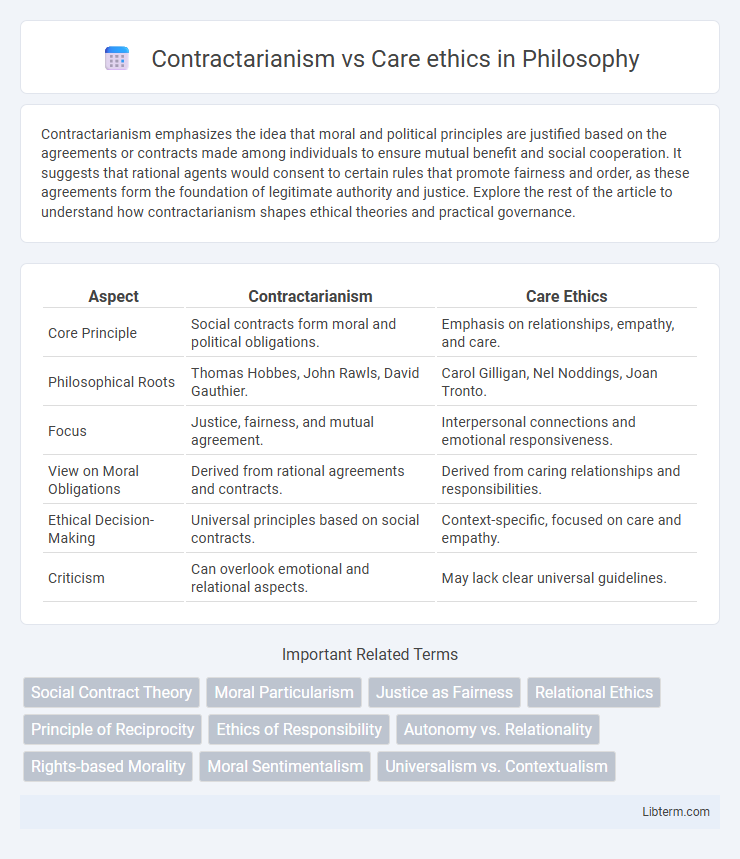Contractarianism emphasizes the idea that moral and political principles are justified based on the agreements or contracts made among individuals to ensure mutual benefit and social cooperation. It suggests that rational agents would consent to certain rules that promote fairness and order, as these agreements form the foundation of legitimate authority and justice. Explore the rest of the article to understand how contractarianism shapes ethical theories and practical governance.
Table of Comparison
| Aspect | Contractarianism | Care Ethics |
|---|---|---|
| Core Principle | Social contracts form moral and political obligations. | Emphasis on relationships, empathy, and care. |
| Philosophical Roots | Thomas Hobbes, John Rawls, David Gauthier. | Carol Gilligan, Nel Noddings, Joan Tronto. |
| Focus | Justice, fairness, and mutual agreement. | Interpersonal connections and emotional responsiveness. |
| View on Moral Obligations | Derived from rational agreements and contracts. | Derived from caring relationships and responsibilities. |
| Ethical Decision-Making | Universal principles based on social contracts. | Context-specific, focused on care and empathy. |
| Criticism | Can overlook emotional and relational aspects. | May lack clear universal guidelines. |
Introduction to Contractarianism and Care Ethics
Contractarianism centers on the idea that moral norms arise from mutually agreed social contracts, emphasizing rational agreement and individual self-interest to establish justice and social order. Care ethics prioritizes interpersonal relationships and the moral significance of care, compassion, and empathy, challenging abstract principles by focusing on the context and needs of vulnerable individuals. These ethical frameworks differ fundamentally, with contractarianism rooted in impartial agreements and care ethics grounded in relational interdependence and emotional responsiveness.
Historical Background and Philosophical Foundations
Contractarianism emerged from social contract theories notably advanced by Thomas Hobbes, John Locke, and Jean-Jacques Rousseau, emphasizing rational agreements as the basis for moral and political order. Care ethics developed from feminist critiques in the late 20th century, particularly by Carol Gilligan and Nel Noddings, prioritizing relational interdependence and emotional responsiveness over abstract principles. The philosophical foundation of contractarianism is grounded in individualism and mutual benefit, while care ethics centers on empathy, context, and the moral significance of caregiving relationships.
Core Principles of Contractarianism
Contractarianism centers on the core principle of mutual agreement or social contract as the foundation for moral and political rules, emphasizing rational self-interest and fairness among autonomous individuals. It prioritizes voluntary consent and reciprocal obligations to create stable and just social arrangements. This ethical framework contrasts with Care ethics by focusing on abstract principles of justice rather than relational and emotional responsiveness.
Fundamental Tenets of Care Ethics
Care ethics centers on the fundamental tenet of relational interdependence, emphasizing empathy, attentiveness, and the moral significance of nurturing interpersonal relationships. Unlike contractarianism, which is grounded in rational agreements and social contracts, care ethics prioritizes emotional responsiveness and the contextual needs of others. This ethical framework values responsibility and connectedness, highlighting the importance of care as a basis for moral action.
Key Differences: Rights, Justice, and Relationships
Contractarianism emphasizes individual rights and justice grounded in mutual agreements, prioritizing fairness and reciprocity within social contracts. Care ethics centers on relationships, highlighting empathy, interdependence, and the moral significance of care as opposed to abstract rights. The key difference lies in Contractarianism's focus on universal principles of justice, while Care ethics values contextual, relational responsibilities and emotional engagement.
Approaches to Moral Decision-Making
Contractarianism bases moral decision-making on hypothetical agreements and mutual benefits among rational agents, emphasizing justice and individual rights. Care ethics centers on relational responsibility and empathy, prioritizing context-sensitive responses to the needs and vulnerabilities of others. The contrast lies in contractarian abstract principles versus care ethics' focus on interpersonal relationships and emotional engagement.
Social Implications and Applications
Contractarianism emphasizes social order through mutually agreed-upon rules, promoting justice and fairness in institutional policies and legal frameworks. Care ethics prioritizes relational interdependence and empathy, influencing policies that support caregiving, social welfare, and community-based programs. Both frameworks shape social institutions differently: contractarianism drives formal justice systems, while care ethics fosters inclusive, supportive social networks.
Criticisms and Limitations
Contractarianism faces criticism for its reliance on hypothetical social contracts that may overlook power imbalances and exclude marginalized groups, limiting its applicability in addressing real-world inequalities. Care ethics is often challenged for its perceived partiality and lack of clear decision-making guidelines, which can make it difficult to apply universally in diverse ethical dilemmas. Both frameworks struggle with balancing individual rights and relational responsibilities, highlighting inherent limitations in achieving comprehensive moral theories.
Contemporary Debates and Synthesis
Contemporary debates between Contractarianism and Care Ethics center on the tension between universal principles of justice and context-sensitive moral responsiveness, with Contractarianism emphasizing social contracts grounded in rational agreement, while Care Ethics prioritizes relational interdependence and empathy. Recent scholarship seeks synthesis by integrating the procedural fairness of Contractarian frameworks with the attentiveness and particularism characterizing Care Ethics, aiming to create more inclusive and responsive ethical models. This synthesis proposes ethical systems that uphold social cooperation and individual rights without neglecting the moral significance of care and emotional bonds in diverse social contexts.
Conclusion: Evaluating Contractarianism and Care Ethics
Contractarianism emphasizes justice through mutually agreed-upon rules, prioritizing impartiality and individual rights in moral decision-making. Care ethics centers on relational context, empathy, and the moral significance of nurturing responsibilities within interpersonal connections. Evaluating both reveals contractarianism's strength in establishing social order contrasted with care ethics' focus on vulnerability and emotional engagement, suggesting a complementary approach for comprehensive ethical frameworks.
Contractarianism Infographic

 libterm.com
libterm.com